


































































































































Volume 47, Number 514, March 2023
Highway Superintendent Theresa Burke and the Town of Red Hook....................................................9
Advertiser / Supplier Index..................................................62
Lots of news, products and services throughout!
President/Publisher
Edwin M. McKeon Jr.
Editor In Chief Craig Mongeau

Sales Manager Kent Hogeboom
Production Mgr.
Controller
John Pinkerton
Judith Nixon
Circulation Mgr. Cathy Printz
Sales/Admin. Asst. Deby Hogeboom

Trade Show Manager
Consultant
Teddy McKeon
On this past Valentine’s Day, contractors who are working on the $2.25 billion I-81 project received a nice gift when a judge ruled that the project can continue. The decision, however, also stated that state transportation officials must complete more environmental reviews before razing the I-81 viaduct through Syracuse. The viaduct is scheduled to be removed in three years.
The judge’s decision is in response to a group called Renew 81 for All, led by former Syracuse Police Chief Frank Fowler and includes suburban towns and others who oppose replacing the 81 viaduct with a “community grid” of city streets.
361 Shoemaker Road Mohawk NY 13407
Phone 315/866-1423
E-Mail - khogeboom@cegltd.com
PRODUCERS OF THE ANNUAL NEW YORK STATE HIGHWAY & PUBLIC WORKS EXPO
Teddy McKeon: General Manager of the NYS Highway and Public Works Show 800/523-2200 email: tmckeonjr@cegltd.com 800/992-7116 email: bbuckley@cegltd.com
OCTOBER 2023 • SYRACUSE, NEW YORK
Mailed 11 times a year by name, to every Town, County, Village and City Highway Superintendent, Public Works Director and D.O.T. official in NY State.
Subscriptions are available to all interested persons at a cost of $25.00 per year within the USA. To subscribe, send your check, voucher or money order for $25.00 to the address above. Single issues $3.00 each
With the exception of Highway Superintendents, Public Works Directors & D.O.T. Officials, material may not be reproduced in any form without the written permission of the publisher.
© 2023 PROFILE PUBLICATIONS PROFILE PUBLICATIONS, SUPERINTENDENT'S PROFILE & PRODUCT-SERVICE DIRECTORY, NYS HIGHWAY & PUBLIC WORKS EXPO & SNOWPLOW ROADEO ARE REGISTERED TRADEMARKS

Bob Buckley Craig
While the I-81 project can proceed, the judge in effect sided with Renew for 81 when he agreed that state’s environmental review is incomplete. He remains concerned about the potential population and traffic surge upon completion of Micron’s chip fabrication plant. Site prep for this project begins this year and is projected to create approximately 5,600 construction-related jobs. What the judge appears to be concerned about is that in total, the new plant is expected to provide 50,000 jobs in the area with 9,000 directly working for the company. The judge also is worried about air pollution along I-481 if the viaduct is removed and traffic is diverted to the interstate. The judge essentially ruled that none of these environmental impacts would occur if the viaduct remains intact.
The state disagrees and said this ruling could eventually delay the project because of the uncertainty of how another environmental study could turn out. The state already conducted a nine-year environmental study, which led it to approving tearing down the viaduct.
The state awarded the first of several construction contracts in January when it awarded a $296.4 million contract with a team called Salt City Contractors LLC, which includes Lancaster Development and Tully Construction, doing business as L&T Construction; and D.A. Collins Construction Co. and Cold Spring Construction Co.
Like the overall project, this fight over I-81 and the viaduct appears to be a long-term situation and it also seems like the state better get moving on another (expedited) environmental review and hope for the best, at least as far they’re concerned. P
Superintendent’s Profile • www.superintendentsprofile.com
• March 2023












































 By Mary Yamin-Garone PROFILE CORRESPONDENT
By Mary Yamin-Garone PROFILE CORRESPONDENT

Theresa Burke is a woman on the move. Whether struggling to keep the town’s budget in the black, providing the best services for the residents or gardening in her spare time, Theresa’s always doing something. And for the past 12 years, that something has been serving as the highway superintendent of the town of Red Hook.
continued on page 12

























from page 9
Before taking office, Theresa worked in the restaurant business for more than 25 years, making a living rather than by choice.
“I owned two restaurants that I had taken over in succession from my mom so she could support her family and then retire,” she said. “After those years, I realized I couldn’t do this for the rest of my life. My children were in grade school, so I made a plan to sell the restaurant. It got a little complicated because we were located on the Taconic Parkway and the state wanted to put in an overpass. I wound up selling the business to the people who worked for me. I was supposed to transition them for a year. Instead, it took five years.
“I was part-time. My husband, John, and I bought our house in Red Hook. After working with me in the restaurant, he went to work for the school. I took a civil service exam and thought I’d also work for the school, so I’d have the same schedule as the kids. Unfortunately, there weren’t any openings. However, my neighbor, who was the village clerk and her husband, the town building inspector, were in the yard one day and said, ‘Oh, the highway department has an opening for a clerk.’ So, I applied for the job.”
What was the real story behind her wanting to become highway superintendent?
For five years, Theresa was the part-time highway department clerk. The superintendent she was working for decided to retire in the middle of his term. The town board appointed someone who then decided to leave after two months.


“The foreman and I had been training this fellow and he simply turned to us and said, ‘You can do this.’ The foreman didn’t want the position. Since I knew the paperwork, the administration and the guys, the crew asked me if I’d take the job.
“In 2010, I interviewed with the town board and got the position. I had to run for a special election for a year. Then, I ran three more times unopposed. I jokingly call it my Cinderella story because I never thought I’d be involved in the highway department. It’s a skill set. It’s business. It’s management. It’s working with people. I had over 50 employees and running two restaurants at once. Being in the restaurant business is one of the most difficult businesses to survive. It taught me a lot about being flexible, making decisions, budgeting and all that kind of stuff. So, you take that into the highway department with you. It’s a business, as well, right? You’re in the business of taking care of the roads for the town. I was self-taught. I knew nothing about the restaurant business when I was a clerk. I managed to be pretty good at both.





























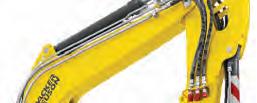


















from page 12
“I know many of the women highway superintendents in the industry. They were working on the crew, in construction or in municipal planning. So, they all had some type of experience. I just came in at a different angle. I’m a pretty fast learner. The crew was training me. I went out with them in the trucks, saw the routes, heard their concerns and learned the language of stone, gravel and rip-rap. Then we started going to classes at Cornell. It was the best as far as getting unbiased information. Where else can you learn the basics? I recently made Roadmaster level four, which is the highest level in Cornell’s program. I received an award at the fall conference. You go through the steps and then you start giving back, teaching classes or presenting at highway school and the conference and mentoring new highway superintendents and things like that.”

This super was born on Mitchell Air Force base in Long Island. Her parents opened up a bar/restaurant in Carmel, in Putnam County.
“I grew up in the business, moving several times, and went through three school districts. Then at 20, I took over my first restaurant for my mother. It had a funny name, called Massoud Musco T. Restaurant, in Katonah, New York.
“I didn’t own that property, so I was looking for a more secure location. My mom had gone from that restaurant to another one in Hopewell Junction because she could live there with her family. When she had to retire due to health reasons, I took over that restaurant. Then, I ran two of them for 10 years. When I started having children, I had to go down to one. So, I sold the business. That’s when I began making my fiveyear plan. Which took longer than five years.
“One reason I wanted a different job was for security. Having a pension, health insurance, a regular paycheck, all factored in. Although you have to run every four years, I knew it was secure. One of my favorite analogies is when I was in the restaurant business and it snowed on a Friday. There goes my payroll, but in the highway department and it snows that’s job security. They’re both weather dependent, but I’ll take the highway, rather than the restaurant any day.
Theresa has one year left to her term.
continued on page 20



Crews replace an old pipe in the Forest Park development.

from page 16
“Then, I can decide what I want to do next. I might run again, and I might not. It depends on the winter and a lot of it also depends on politics. I was never a politician. I had no clue what I had to run. I ran in the Independence Party, which now you can’t even do because they didn’t make the ballot. I wasn’t interested in taking sides. Because to me, it’s not that kind of job. People like to make it that kind of job, but it’s not that kind of job to me. Being elected is better than being appointed, because you can make the decisions you need to make without someone else telling you what to do. You work for the people and that’s a whole different ballgame.”
Theresa is a mother of two.
“My son, Kevin Wiley, is 29. He’s the regional director for Compass Group, a food service corporation. My daughter Lisa is 28. She’s a registered dietitian at a nursing home in Kingston.”
In her “free” time, Theresa loves gardening.
“I have a little house in the village with a half-acre where I do a lot of flower gardening and landscaping. I love going on beach vacations anywhere I can. Places like Manfra, Cape Cod, Rhode Island and mostly
New England beaches. I volunteered at the community center running a free donation room called the Clothes Closet for several years for people in need. Also, my husband and I were planning on going on a river cruise in Germany to see my sisters. Because of COVID, we canceled our trip two years in a row. Then, with my mom passing, we had to cancel again. Now, we’re scheduled for next August. That’s a dream vacation waiting to happen.”
She’s also busy in her roles as secretary for the NYS Association of Town Superintendents of Highways and president of the Dutchess County Association of Town Superintendents of Highways.
When asked what she’d like to do when she finally retires, Theresa thought for a minute before answering.
“There are still many projects I’d like to work on. So don’t rush me. I’m enjoying the job and I derive great satisfaction from it.”
When it comes to facilities, Theresa has one main garage that’s 100 ft. by 200 ft. and was built in 2012.
continued on page 26






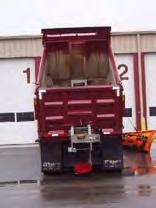



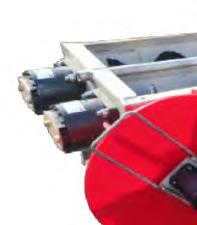














5985 Court Street Road Syracuse, NY 13206

(315) 437-2611

The JCB H for purpos JCB is the the JCB H serviceabil JCB back excavating
















ydradig 110W is the first w se and without compromise e first to move the engine, t ydradig 110W first for visib ity


(585) 344-1931 LTTA


, maneuverability , stability ility












heeled excavator and tool carrier designed . The result is an engineering masterpiece. anks and ancillaries to the chassis, making y, y, y, , mobility and


hoe loaders are versatile m , loading, lifting and materi achine that is easy to mainta ftJCBidthb ain and simple to operate. T
years after JCB pioneered the bac the world leader in backhoe technolo loaders are the most popular and mo many backhoes around the globe as a Discover the Teeleskid, the wo compact track loader with a telesco further and dig deeper than any skid s work sites and perform tasks that are s steer machine.
achines that combine excellent trenching, al handling capabilities with the benefits of Tooday, more than khldi1953th i
ckhoe loader in 1953, the company remains gy, innovation and capability. JCB backhoe st trusted in the world, with JCB selling as ll other manufacturers combined
JCB T
ping boom, allowing it to lift higher



rld’s first and only skid steer loader and r, , reach teer on the market. NOW YOU CAN! access imply not possible with a conventional skid

833-Go2 pNY -ALTTA A | AltaEqui Y..com













































































from page 20
“Getting the new garage was my shining moment. We were in a 1930s Quonset hut that was moved in the ’70s. When I was clerk, I’d open my door and hit the wing of the plow. There weren’t any windows in my office that went to the outside. There was a window you could see to the inside of the garage.


“An interim person was appointed for two months. He moved us into a trailer that sat out in the parking lot. They’d been planning this new highway garage for 14 years and never pulled the trigger. So, with the supervisor who was in place, her political will, a raccoon falling out of the ceiling and the insurance company condemning it, we needed to move. We’ve got a beautiful building. We were able to sit at the table during the design process and give our input on what we thought would work. I love the highway garage. Of course, every design has flaws that come up later but nothing major. If there’s only one thing I did in my tenure that will be a lasting impression, it’s that highway building.
continued on page 40







































e know that your environment is different, and that your ou’ve told us what matters to you. W Yo
Y needs are unique. You are not contractors; competition is not a driver






e have , but trust is. W r, Yo
open communication, and respect. Our equipment is for the long run – so are we. listened. Our focus is on establishing relationships that are built on clear understanding,





reach. Good UC. Ditching bucket. Afex fire suppression system. WE HAVE A NUMBER OF LONG REACHES AVAILABLE FOR RENTAL!!!









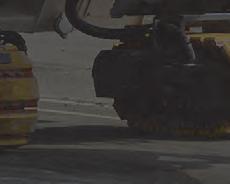











108SD’S 114SD’S 122SD’S PLOW & VOCATIONAL MODELS AVAILABLE
Various New York State and National Contracts Available
2-7 Yr Govt Financing New: M2-106’s, M2112’s, 108SD’s, 114SD’s
(No Bidding Required)
“Real People Answer The Phone”
CHECK OUR PRICES
INDEPENDENT, FAST FRIENDLY SERVICE WE WORK WITH ALL BODY BUILDERS
Now reserving Production Slots for 2022 on 114 SD’s, 108SD’s, M2 -106 112’s % Cascadia’s All dates coordinated with bodybuilders equipment availability
MOHAWK VALLEY FREIGHTLINER 703 Oriskany Blvd., PO Box 201, Yorkville, (Utica) New York 13495 866-830-1463 • 315-736-3330 • 315-736-3287 fax

rwoods@mvfreightliner.com

www.mvfreightliner.com

Rick Woods Sales & Engineering
Empire Radiator Service
606 Hague Street Rochester, NY 14606
585-254-7140
www.empireradiator.com
Fuel Tank Restoration and Repair
We are the only full service fuel tank restoration and repair facility in up-state New York. New U.S. made aluminum tanks.

TitanX original equipment quality radiators for Mack MR Series and other trucks. Call for availability and price.
Radiators, Charge Air Coolers, Oil Coolers
New, Recores, Repairs, Custom Designed aluminum and copper brass
DPF, DOC, and EGR Cleaning
Controlled burn baking and dual forced air and suction ensures all cells are cleaned. Damaged fittings can be repaired or replaced
Burn Off Oven
Complete removal of paint and grease from your parts and equipment.
Fluid Lines
Hydraulic, including steel, AC and Brake lines
Other Services
Aluminum and steel welding. Press brake, mill, lathe, notchers and sheers. Wet and dry sand blasting, caustic boil out, acid and solvent cleaning, high pressure wash.
571 Route 212 Saugerties, NY 12477
www.amontanoco.com


HEAVY EQUIPMENT TRANSPORT AND SERVICE

Sourcewell Contracts For: Hyundai, Morbark, Diamond, Towmaster, Boxer & Rayco

®








from page 26
“We also have an aging salt shed that was built in the 1990s. It’s a wooden structure that’s starting to show its age. If you packed it full, it would hold about 500 tons, but we get about 300 tons at a time. The board is looking for a grant to replace it now. My predecessors took down the pole barn to make room for the highway garage, so we’re still short on storage space. We share two bays with the village of Red Hook.”
As superintendent, it’s Theresa’s job to maintain the town’s 119 lane miles of road; 2,000 ft. of which are gravel and the rest are paved. All of that translates into five or six plowing routes that take approximately three or four hours to complete.

She depends on her crew of six full-time employees and one parttimer to serve the town’s 10,000 residents. Her staff includes Foreman John Gardinier; HEO Michael Miller; MEOs Steve Cegelka, Robert Feller III and Ray Casivant; and Highway Department Clerk Lori Pierce.
Under Theresa’s watchful eye, the town of Red Hook’s highway department functions on a total operating budget of $1,328,073 that includes salaries and benefits for employees and an annual CHIPS allocation of $168,250.71. The town also receives $44,666.29 for PAVENY; $37,796.26 for Extreme Winter Recovery; and $29,777.53 for Pave Our Potholes.
To help get the job done, the department uses a modest fleet of equip-
ment. Who’s responsible for maintaining all that equipment?
“We do whatever we can in-house. We had a mechanic, but we don’t have a titled mechanic, anymore. So, we work within the parameters of what they know how to do. They’re all pretty handy with mechanics and help each other out. With the newer trucks and all of the computerized equipment, a lot of times it has to go out. We do what we can when we can and when we can’t, we have places to bring it.
“We have a capital equipment plan, but there’s no funding designated just for equipment. Usually, it takes three years to get something and pretty much what you have to do is show that what you have is no longer valuable. If you go over 15 years, it’s hard to get parts, safety features are missing and things are rusting away. I have to say, I’ve been persistent, and we’ve upgraded our fleet. It’s light years away from what it was when I started. I’ve been fortunate that the town has funded replacement equipment. They just don’t fund new items. They’ll replace your backhoe, your loader, your plow truck, but they don’t often add anything else.”
Now, 12 years later, what’s been the most important part of Theresa’s job?
“Being available to the people and your staff in order to get the work done. I don’t know how to answer that. You have to take responsibility for these roads. You’re keeping your crew safe and trying to enhance the safety of the public, especially during snowstorms.”
continued on page 46















































from page 40
Favorite part of the job? “It’s never boring.”
Least favorite? “Convincing the town board to invest in the department.”
Best day on the job? “Groundbreaking for the new garage.”

What’s disappointed you?
“Having to prove the value of the services the highway department provides to the town board in order to get the necessary funding. I think every town board member should be required to ride during a storm. Sometimes, you get this big disconnect between the reality of the job and what the town board thinks it is unless you actually experience it.
“That was one of the biggest eye openers for me — getting in that vehicle with my foreman during the blizzard the first year I started. It was December 26, 2010. I couldn’t see a thing. It was scary. I rode with the foreman in his one-ton pick-up truck and there’s no road. I asked, ‘How do you know where you’re going?’ He replied, ‘Well, sometimes I don’t.’ Scary because the first storm there’s no benchmark. Then, I asked if he ever turned around and just went back. He said he hadn’t yet.”

Theresa turned into a wing-man pre-COVID.
“If the guys were short, I’d go in the truck. I learned how to run the wing and plow. That was the least I could do. Again, I made each of them take me in their truck, show me their roads, the issues, the difficulties. That way you get to learn why people shouldn’t put their garbage cans in the road. Or why a 30,000-pound-plus truck can avoid a mailbox. It’s learning and if everyone on the town board did that, maybe it wouldn’t change their minds about the funding, but it might give them a better appreciation for what these people actually do. It’s that simple.
The department removes a tree stump after a storm. continued on page 50 Theresa oversees a drainage project on Old Post Road.Contract #032119 - HCE Heavy & Medium Construction Equipment
NYS OGS Contracts
Group #40625 Award 22792
Heavy Equipment NYS Contract #PC69513
Contract #040319 - HCE Medium & Compact Equipment
Contract #080818 - FAM Snow Removal Equipment
Contract #121918 - MNR Flatbed Equipment & Lowboy Trailers
NYS OGS
Heavy Equipment Rental Contract

Group #72007 Award 23182
Contract #PS69107 SB
GEORGE & SWEDE SALES & SERVICE 7155 Big Tree Road Pavilion, NY 14525 (800) 724-8722

email:gregnewell@rochester.rr.com www.georgeandswede.com

TRACEY ROAD EQUIPMENT INC.
(800) 872-2390
Albany, NY Binghamton, NY Syracuse, NY Queensbury, NY Watertown, NY www.traceyroad.com
A. Montano co. INC. 571 Route 212 Saugerties, NY 12477 (845) 247-0206 www.amontanoco.com

ALL ISLAND EQUIPMENT 39 Jersey Street West Babylon, NY 11704 (631) 643-2605 www.allislandequipment.com













“We did that with one of our board members and we got a replacement for our 28-year-old plow truck. However, with COVID and a new board, you couldn’t have people in the truck with you. Sometimes, they don’t understand the difference between using a pickup truck and a sixwheeler. They don’t have that frame of reference so you’re constantly educating the members. Sometimes, they’re not listening because they don’t see the reality with every board change. It’s educating, again. It’s a constant thing you have to do.”
What’s been the worst day?
“When the town board decided to eliminate two of my crew members. You have your budget set for the year and for some reason, the town board said, ‘Oh, no. With COVID, we’re going to run out of money. So, you’ll have to get rid of two people. I told them I’d like to talk to the town board before doing that.’ Instead, they went ahead and ignored that request and eliminated two positions. The guys had to leave. Someone else retired, so I got one back. Two years later, I got the other one back after he retired, but my staff has been permanently reduced from eight to six.
“It wasn’t the why as much as the how. I don’t believe in going backwards, but it was the worst day because I had to look at these two guys. One worked there for 11 years and the other for five and I had to tell
them they lost their jobs. Now you’re on unemployment. You didn’t get laid off. You were eliminated. There was no negotiating. No discussion. No warning, which I found disrespectful, but you can’t go back there. It was hard. These guys worked together for a long time.
“I see a real crisis in staffing as people retire. CDL drivers are in high demand and municipalities aren’t competitive. There needs to be recognition of the essential services we provide and invest in staff, equipment and maintenance. I’m anticipating difficulties as we try to operate with historically low staffing levels. People have to be aware of that because it’s happening now.
“Towns need to recognize the value of their highway departments and invest in people and equipment. You can’t get part-timers to do this job, anymore. Traditionally, people came to municipal jobs because they had great benefits, job security and decent wages.

“Fast forward 20 years. Wages haven’t kept pace with the rest of the private sector. People have had to contribute more and more to their insurance packages, as the costs have risen. During COVID, the illusion of job security was destroyed. So, what are we attracting the next workforce with? That has to be answered by those who fund the highway departments. Because you don’t have a workforce that’s aging into retirement when people stay in a place for 20 or 30 years. Suddenly, there’s going to be this void and it’s happening now.
continued on page 54
















For over three quarters of a century Suit-Kote has been building smooth roads from horizon to horizon. And unlike the uncertainty of the open sea, you can always be confident that the open road we build promises you smooth sailing. At Suit-Kote, we’re committed to one thing – getting you there.


from page 50
“You have to make some changes. Many of them involve money. That’s the hard part. There’s also something to be said for increasing the level of respect for the jobs that are done in the highway department. That’s true throughout the blue collar sector, but we’re emergency responders. We’re essential workers. You have to fund that because without them you’re all stuck.”

When it’s time to hang up her hat, how would Theresa like to be remembered?
“I’d like the community to recognize that things were a little better than when I started. Whether that be next year or 20 or 25 years. My goal is to leave the town a little bit better than I found it.”
Red Hook is a town in Dutchess County. The population was 9,953 at the time of the 2020 census, down from 11,319 in 2010. The name is supposedly derived from the red foliage on trees on a small strip of land on the Hudson River. The town contains two villages, Red Hook and Tivoli. The town is in the northwest part of Dutchess County.

The town also contains two hamlets. Bard College is in the hamlet of Annandale-onHudson. The Unification Theological Seminary is in the hamlet of Barrytown. Both hamlets are located within the Hudson River Historic District.
continued on page 60
The town of Red Hook highway department’s garage and equipment. The department stockpiles materials in the highway garage lot.







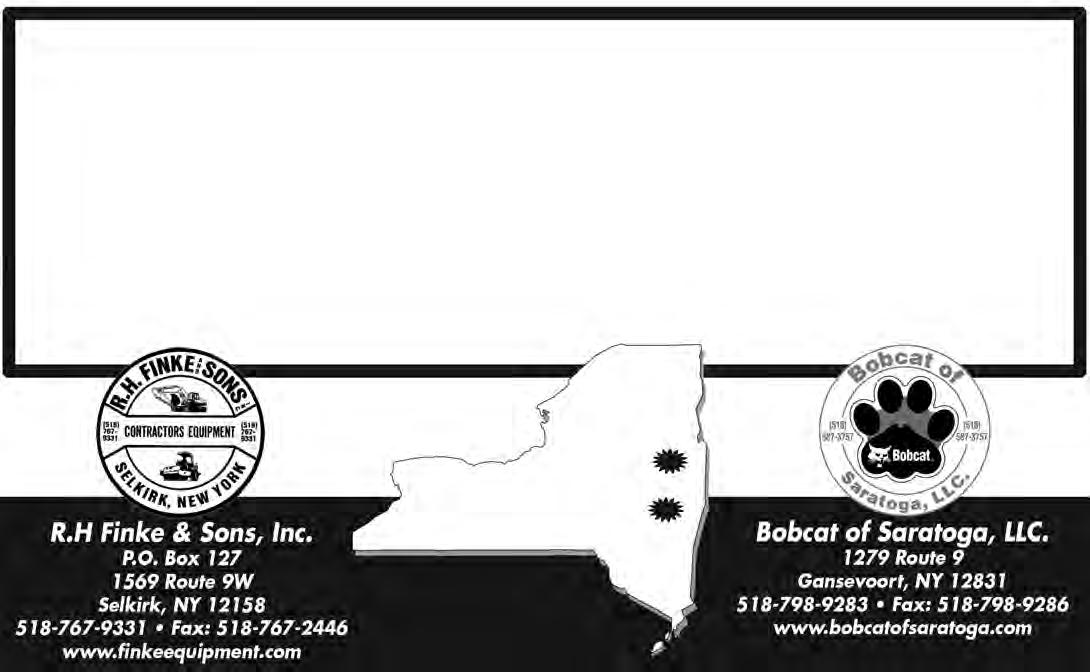











518-767-9331
NOW
1569 US Route 9W
Selkirk, NY 12158
Toll Free: (888) 266-9821
“We are not a national chain.”
IN
WIRTGEN AMERICA:
• NJPA CONTRACT #060311‐WAI
(Wirtgen Milling Machines, Vogele Pavers, Hamm Rollers)
DOOSAN:


• NJPA #060311‐CEC
(Excavators, Wheel Loaders, Articulated Dump Trucks)





• NEW YORK CONTRACT # PC66576
• AWARD# PGB22792 (Skidsteers, Trackloaders, Mini Excavators)


NITEHAWK SWEEPERS:

• NJPA CONTRACT #122017‐NHK



















from page 54

The original inhabitants of this land were the Mohican, Munsee and Lenape people. During European settlement, Native American tribes played a fundamental role in the area’s economy as they traded beaver skin with European settlers. European settlers imported several foreign goods, such as cattle, horses and sheep. Enslaved African American individuals were also brought. Through importing non-native species, the landscape and ecology of this region has been dramatically changed.
European settler-colonial understandings of land-ownership are different from the perspectives of Mohican, Munsee and Lenape land use, a difference not often reflected in the land deeds that establish European presence on this land. The Lenape believed that Kishelëmukòng had created the earth for all people and creatures, meaning that land could not be appropriated by any individual or despoiled for personal profit. In this way, this group of people did not understand the process of selling land, but believed they would receive continued access to it to hunt, fish, forage or even plant crops. Through Schuyler’s Patent, English settler Peter Schuyler acquired two tracts of land from unidentified native peoples, “one near Red Hook and one south of Poughkeepsie” in 1688. One of the three place-names identified in Schuyler's Patent is given in the Munsee language.
Prior to 1812, Red Hook was part of the town of Rhinebeck. Because Rhinebeck, as well other towns, had populations over 5,000 residents, the state legislature authorized the separation of these two precincts on June 12 to accommodate and encourage public attendance at town meetings via horseback or carriage. The first documented town of Red Hook meeting was on April 6, 1813, in a local inn and held yearly afterwards as required by law. Wealthy landowning farmers oversaw the maintenance of their assigned roads with the help of their farm workers and neighbors. The Red Hook Society for the Apprehension and Detention of Horse Thieves is thought to be one of the oldest formal organizations in the state and still holds an annual meeting.
(History courtesy of https://en.wikipedia.org/wiki/Red_Hook,_New_York) P












